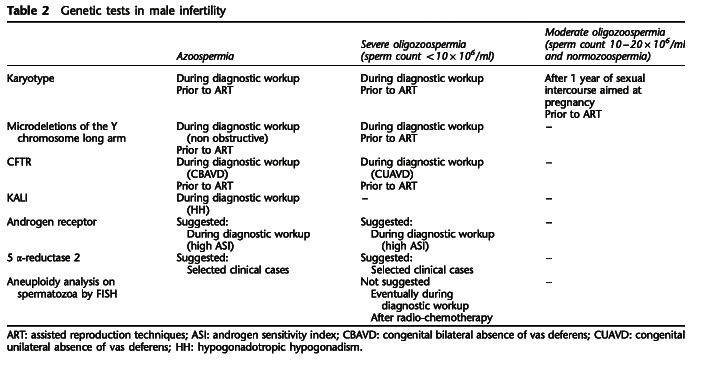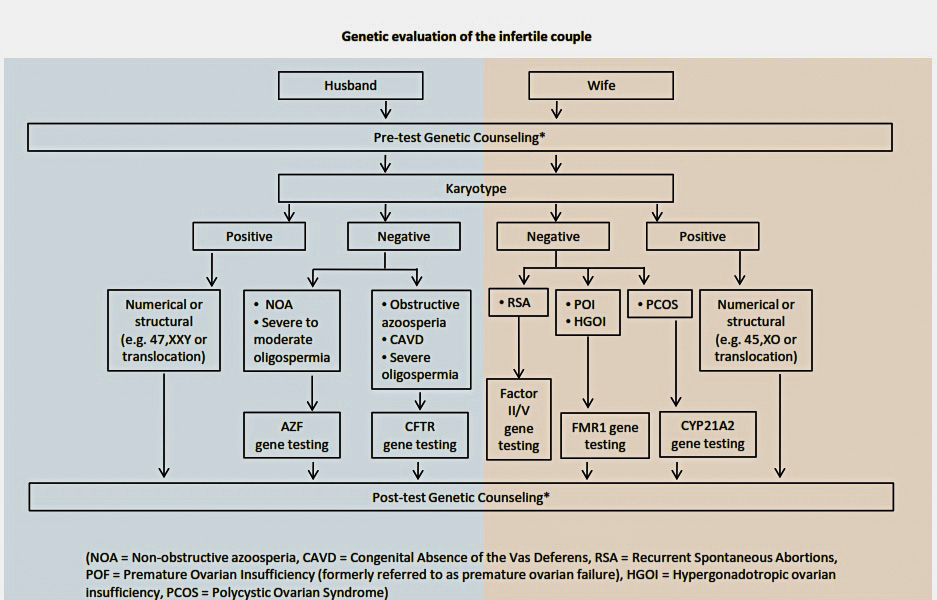Is Infertility Genetic? | Genetic Causes of Men & Women’s Infertility
Female Infertility, Male Infertility
Genetics and infertility are interlinked and have started raising many questions with the development of medical science. Genetic education or genetic counselling is a less practised trend in this country and people ignore this important cause of infertility issues. The truth is genetics is as important as other environmental factors that cause infertility. In this article, we are going to discuss and explore if and how genetics causes infertility.
What is infertility?
Infertility is a complex condition of the reproductive system. It is defined as the inability to achieve pregnancy after one year (or longer) of unprotected sex. Some providers evaluate couples for infertility after 6 months of unprotected sex if the female partner is 35 years or older. Infertility is equally attributed to men and women. Infertility is, in fact, not uncommon, and nearly 15% of all couples planning a pregnancy experience infertility.
Infertility Can have a Genetic Cause: Genetics of Infertility
Approximately 10% of couples experiencing infertility have an underlying genetic cause. In the absence of a genetic evaluation for infertility, couples are routinely subjected to a battery of physical tests that are not only expensive and time-consuming but can also cause significant psychological distress. Identifying the exact cause of infertility facilitates more well-informed medical decisions and can help parents-to-be understand any potential risks it poses for their future children and can guide appropriate treatment. It also permits healthcare professionals to offer a prenatal diagnosis when appropriate.
The use of intracytoplasmic sperm injection (ICSI) in the treatment of infertility has raised major concerns about risks to the offspring, as it bypasses the natural physiological mechanisms that lead to fertilization. While natural selection prevents the transmission of mutations causing infertility, this protective mechanism is overcome by the assisted reproduction techniques (ART). Consequently, the risk of a genetic cause of infertility increases in future generations. Therefore, the identification of genetic factors in a couple experiencing infertility has now come to become good practice for appropriate management of the infertile couple.
“GENETIC EVALUATION PLAYS A VITAL ROLE IN HELPING COUPLES ACHIEVE NOT ONLY A PREGNANCY, BUT ALSO THEIR DREAM OF A FAMILY.”
Can we quit the blame game, please? It’s no one’s “fault”!
Oftentimes, the reasons why a couple cannot have a baby can be difficult to determine. Finding a male factor as the sole reason for a couple’s infertility is seen in about 20% of infertile couples. Yet, sadly, infertility is often thought of as a “woman’s issue”, and this does a great disservice to couples pursuing an evasive pregnancy. Evaluating both partners is critical in the assessment of couples with infertility. It is important to remember to be sensitive- No one really wants to experience infertility, and no one did anything to intentionally cause themselves to experience infertility. It is not their fault! The purpose of establishing a cause of infertility is not to point fingers, but to medically address that cause in the most appropriate way. Genetic evaluation of couples experiencing infertility helps identify:
- Potentially correctable conditions
- Irreversible conditions that can be addressed using assisted reproductive techniques (ART)
- Irreversible conditions that cannot be treated via ART
- Serious genetic conditions underlying infertility that require medical intervention
- Genetic abnormalities that pose a risk for ART to pass on a specific genetic condition to future children
Is Male Infertility Genetic?
In males, genetic abnormalities may cause infertility by affecting sperm production or sperm transport. The most common genetic causes of male infertility are cystic fibrosis gene (CFTR) mutations, chromosomal abnormalities, and Y-chromosome microdeletions. In fact, up to 15% of men with low or absent sperm counts have Y chromosome microdeletions. Detecting the type of Y chromosome microdeletion is extremely significant as:
- Most men with Y chromosome microdeletions will not have retrievable sperm with TESE (testicular sperm extraction)
- Contrastingly, men with AZFc Y chromosome microdeletions (which is the most frequent microdeletion of the Y chromosome) have an 80% success rate of sperm retrieval
Without knowing the type of Y chromosome microdeletion, physicians and couples may pursue a reproductive option that offers little chance for pregnancy success. Y chromosome microdeletions are too small to detect through standard karyotyping, but both Y chromosome microdeletions and karyotyping can reveal genetic causes of male infertility.
Karyotyping
Karotyping can detect chromosome abnormalities such as inversions and balanced translocation that is prevalent in infertile male populations compared to the general population.
While an in-depth discussion of all the genetic causes of infertility in men is beyond the scope of this article, speaking with a genetic counsellor can be extremely helpful in helping couples understand what might be the most appropriate test for them. Overall, genetic tests useful in the evaluation of males are outlined in the table below:

Common Causes Of Infertility In Men
Other important, but rare, causes of infertility in men include genetic conditions in which infertility is a minor manifestation. Some of these genetic conditions include:
- Myotonic dystrophy
- 5-alpha-reductase 2 deficiency
- 21 alpha-hydroxylase deficiency
- Bardet-Biedl syndrome
- Fanconi anemia
- Homozygous beta-thalassemia
- Hemochromatosis
- Cerebellar ataxia with hypogonadotropic hypogonadism
- Prune Belly syndrome
- Prader-Willi syndrome
Genetic causes of Infertility in Women
In Female, genetic abnormalities may result in infertility by affecting the reproductive cycle and/or hormonal balance. A genetic cause for couples experiencing infertility can be found in about 10% of women. These genetic findings include chromosome aberrations and single gene mutations. The most common genetic causes of female infertility are chromosomal abnormalities and mutations in the FMR1 gene on the X-chromosome, responsible for Fragile-X syndrome.
Karyotype analysis is an important component of the diagnostic workup of women with infertility. This is especially significant for those women presenting with primary ovarian dysfunction or recurrent fetal loss/miscarriages. Karyotype analysis for the identification of chromosomal abnormalities should be included as a mandatory diagnostic test in the evaluation of infertility in women.
Fragile X syndrome is the most common inherited cause of mental retardation and the most common genetic cause of autism worldwide. Fragile X may cause intellectual disability, learning and behavioural challenges, and sometimes, seizures. It tends to be more severe in boys than in girls. Women who are carriers of Fragile-X do not show symptoms of Fragile-X syndrome but may be at risk for related disorders such as Fragile X-associated Tremor/Ataxia Syndrome (FXTAS). Importantly, from a reproductive point of view, they are at risk for premature ovarian failure– a condition that is often times picked up during routine infertility tests as low AMH/high FSH.
Important genetic tests in the evaluation of infertility in women are listed in the table below:

In addition to these commonly used genetic tests, depending on family history and genetic counselling assessment, there are a few genetic conditions that may present as infertility among women. These genetic conditions include:
- Galactosemia
- Mucopolysaccharidoses
- Myotonic dystrophy
- 21 alpha-hydroxylase deficiency
- Hemochromatosis
- DAX1 mutations
- Homozygous beta-thalassemia
- Prader-Willi syndrome
When Should You Consider Genetic Counselling?
A referral to a genetic counsellor is appropriate in the following situations:
- Failure to conceive after trying to get pregnant for six months or longer
- Low sperm count, abnormal sperm morphology or movement
- Irregular or absent menstruation
- Small or atypical genitals and secondary sexual features (hair, breasts, etc.)
- Known fertility problems
- A history of >1 miscarriage
Process Of Genetic Counselling

What does a Genetic Counselor do?
Are you looking for genetic counselling? We will arrange your appointment with the right genetic counsellor Just give us a message!
Genetic counsellor will help you identify the real cause of infertility and provide solutions. Mostly cases of unexplained infertility hint towards genetic reasons. Though genetic counselling and tests are expensive but then they can also increase IVF success chances. Knowing the cause of infertility is actually the solution in such cases. Also, you may eliminate any risks of genetic issues for the baby (embryo) that you will conceive popularly known as PGS or PGD tests.
When To Go For Genetic Counselor?
You can opt for genetic counselling at any stage of fertility, infertility journey and early conception ( preferably first trimester). In many cases after a failed IVF or post recurrent miscarriages, a couple is advised for genetic counselling.
If you are confused, do connect us for proper counselling and understanding of genetics.
About the Expert
 Pooja Ramchandran, Director of Genetic Counselling, MapMyGenome
Pooja Ramchandran, Director of Genetic Counselling, MapMyGenome
A graduate of Johns Hopkins University (2008), Pooja is the first Genetic Counsellor in the country with a formal degree in the same. Other than MapMyGenome, she has been associated with a couple of prestigious organizations such as Eastern Biotech and Life Sciences in Dubai, Positive Bioscience and Nutragene. She is also associated with Cancer Patients Aid Association (CPAA) and provides cancer genetics education as a volunteer. Her work is not only appreciated in India but by other countries across the globe.





Your Comment Is Valuable For Us
Thanks For Your Feedback.